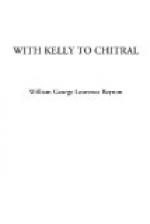It appears that after the first few of us had gone down the cliff, and the rest were preparing to follow, a bullet struck some cakes of gun-cotton lying on the ground by the head of the path, where they had been placed while the Sappers were at work. The bullet, striking these cakes, ignited them, and they blazed up, and Borradaile, fearing an explosion, ordered a retirement of those troops nearest it to cover some thirty yards in rear, where they were protected by a wave of the ground. The enemy, seeing our men bolting, as they thought, rushed out of their sangars, but were promptly fired into by the Pioneers. Just then the Levies on the ridge and our small party showed across the nullah, threatening their line of retreat; this was apparently more than they had bargained for, so they began to bolt, as I have said. Then the Pioneers moved down the nullah and crossed by the goat track.
Peterson’s company had found a box full of Snider ammunition in one of the sangars, so the Kashmir Company was sent back to look for any more, and also to demolish the sangars. I took the opportunity to have a look at them too. I was surprised at the magnificent way in which they were built, partly sunk into the ground, and made of huge boulders that required many men to move, and with head cover constructed of logs in the most approved fashion, evidently made by men who had been properly instructed. As I neared the largest sangar, I saw a native clothed in a red dressing-gown, sitting on the ground with a long native jezail. Rather surprised at seeing one of the enemy thus armed, I went up to him, and as I did so, he picked up his gun. I had my revolver on him in a second, and told him to drop the gun, which he did. I then asked him who he was, and found he was our long-lost child—I mean levy—who had been captured at Laspur. The enemy had not treated him badly, but had taken his carbine and his choga, hence the dressing-gown; in return he had sneaked a gun when the enemy were flying. I set the Kashmir troops to work, and then went back, meeting Humayun and his captives on the way.
“Humayun,” I said, “your levy is over there.”
“Is he alive?” said Humayun, looking in a most bloodthirsty way at his prisoners.
I assured him he was. Thereupon Humayun gave a jump, caught hold of both my hands, and kissed them violently. I was afraid he was going to kiss my ruby lips, but he didn’t. He and Akbar Khan then went scuttling across country to the sangar, followed by a crowd of his men, whooping and yelling with joy.
The guns were now coming across the nullah, and the column was being formed up with the intention of crossing the river to Sanoghar, where it was proposed to camp for the night. Part of the Levies and a company of the Pioneers were sent ahead to clear the village of any evilly disposed persons; arrangements were made for bringing up the sick and wounded; and a signal message was flashed back to Mastuj for the baggage to come out.




